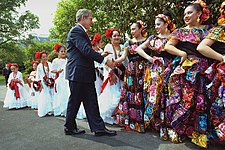Have you ever found yourself on a bustling street in a foreign country, overwhelmed by the unfamiliar sights, sounds, and smells? Despite the differences, you might notice a familiar gesture—a wave, a smile, or a nod of greeting—connecting you to these strangers in a moment of shared human experience. This is the magic of cultural universals, the undeniable common threads that weave humanity together, regardless of geographical boundaries or cultural backgrounds.

Image: slideplayer.com
Cultural universals are the fundamental patterns and practices that exist across all human cultures. They are the invisible blueprints that shape our interactions, our beliefs, and our understanding of the world. But why do these universals exist? Why, despite the vast diversity of human cultures, do we find such remarkable commonalities in how we express emotions, address social needs, and organize our societies?
Exploring the Roots of Cultural Universals
To understand the existence of cultural universals, we must delve into their origins, the factors that have shaped their emergence across diverse societies. Several key theories offer valuable insights:
1. The Biological Foundation:
Our shared biological heritage as humans lays the groundwork for many cultural universals. Our brains are wired with inherent predispositions that influence our behaviors and social interactions. This includes:
- Language: The ability to communicate through language is a uniquely human trait. While languages vary widely in structure and sounds, the basic principles of grammar and syntax are present across all languages. Our brains are hardwired for this complex communication system, facilitating the development of language in every human society.
- Emotions: Universal expressions of emotions, like smiling, frowning, and crying, reflect underlying biological mechanisms. These expressions are recognized and understood across cultures, suggesting a shared evolutionary foundation for human emotional responses.
- Social Structures: The need for social connection is deeply ingrained in our biology. Our brains are wired for cooperation and interdependence, leading to the formation of social groups and the development of social norms and expectations in all human societies.
2. The Evolutionary Advantage:
Beyond biological factors, cultural universals can also be explained by their evolutionary advantage. These patterns and practices have likely contributed to the success of our species by addressing fundamental human needs:
- Survival: Cultural universals like kinship systems, marriage, and social sanctions have ensured the survival of our species. Strong family bonds and cooperative social groups have provided safety, support, and the means to raise offspring in a challenging world.
- Procreation: Cultural universals related to courtship, marriage, and family structure are crucial for procreation and the continuation of the human lineage. These patterns have facilitated the formation of stable relationships and the raising of healthy children, contributing to the perpetuation of our species.
- Cooperation: The development of cultural universals has enabled humans to cooperate effectively. Sharing resources, forming alliances, and establishing social hierarchies have allowed for the creation of complex societies and the solution of collective challenges.

Image: www.collegesidekick.com
3. The Adaptive Nature of Culture:
Humans are remarkably adaptable, and culture plays a crucial role in our ability to thrive in diverse environments. Cultural universals can be seen as adaptations to the challenges and opportunities we face as a species:
- Social Norms: Cultural universals like rules of etiquette, social hierarchies, and moral codes provide a framework for social order. These norms establish expectations and reduce conflict, creating a predictable and functional society.
- Belief Systems: Religion, mythology, and belief systems are found in all cultures. These systems offer explanations for the unknown, provide a sense of meaning and purpose, and guide moral behavior. By addressing our existential concerns, they contribute to our well-being.
- Artistic Expression: Artistic expression, from music and dance to storytelling and visual arts, is a universal human phenomenon. It allows us to express ourselves, share our experiences, and connect with others on a deeper level.
The Power of Cultural Universals: Connecting Across Boundaries
Cultural universals provide a foundation for understanding and connecting with others, transcending cultural differences.
- Shared Humanity: They remind us of our shared humanity, recognizing the fundamental similarities that exist between all people. By acknowledging the common threads that bind us, we can build bridges of empathy and understanding across diverse societies.
- Global Citizenship: Cultural universals contribute to a sense of global citizenship, recognizing our interconnectedness as members of a global community. By appreciating the universal values and aspirations that unite us, we can foster cooperation and promote peace on an international scale.
- Respect and Tolerance: Understanding the universality of certain practices allows us to engage with different cultures with greater respect and tolerance. By embracing the value of cultural diversity, we can create a more inclusive and harmonious world.
Navigating the Diverse Expression of Cultural Universals
While cultural universals provide a framework for human connection, it is essential to recognize the diversity of their expression across cultures.
- Context Matters: Cultural universals are expressed differently in different contexts. For example, marriage, a universal practice, takes diverse forms across cultures, influenced by factors like social structure, economic conditions, and religious beliefs.
- Cultural Nuance: Understanding the specific cultural context is crucial for navigating intercultural interactions. What may be considered polite in one culture might be perceived as rude in another.
- Intercultural Awareness: Developing intercultural awareness requires an open mind, a willingness to learn, and a commitment to respectful communication.
Why Do Cultural Universals Exist
Building a More Inclusive and Understanding World
As we learn more about cultural universals, we gain a deeper appreciation for the complex and fascinating tapestry of human cultures. By embracing the power of these universals, we can bridge divides, foster cooperation, and create a world where diversity is celebrated and difference is understood.
Let’s continue to explore these universal threads that bind us together, celebrating the richness and beauty of human cultures while acknowledging our shared humanity.



/GettyImages-173599369-58ad68f83df78c345b829dfc.jpg?w=740&resize=740,414&ssl=1)


